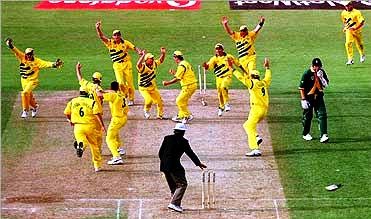COLD
COMFORT FOR FAVOURITES
IN
DEAD HEAT
England v India • Chinnaswamy Stadium,
27 February 2011
This
was a key contest in India’s bid to wrest the title on home turf. Sachin Tendulkar
and the belligerent Virender Sehwag provided a-run-a-ball start. After a
charmed early life, the Delhi blaster fell for 35 off 24 deliveries with 6
boundaries, the total four short of 50. Gautam Gambhir helped the little master
carry the team to a seemingly unassailable position. Tendulkar gradually
assumed the role of aggressor. He tonked Paul Collingwood for 2 sixes, and then
blasted Graeme Swann for two more off successive deliveries. James Anderson too
came in for special treatment as the duo carved three boundaries in an over.
Just
when they seemed to have seized control, with Gambhir bringing up his
half-century, the canny Swann knocked back his stumps. The second wicket had
realized 134 runs in 21.5 overs. Another left-hander Yuvraj Singh filled the
breach, and India continued to cruise. Tendulkar raised his fifth hundred in
the World Cup, flicking the ball off his hips to the boundary. He had faced 103
deliveries. In the next over he rocketed Swann for his 5th six. Now
looking to score off every ball, Tendulkar fell for 120 off 115 balls, having
cracked 10 boundaries besides his five delightful shots over the ropes. The
stand was worth 56 in 8.4 overs. Skipper Mahendra Dhoni joined in the fun,
helping Yuvraj add another 69 runs in just 7.4 overs. The latter brought up his
fifty but the two strokeplayers fell off successive deliveries. At 305 for
five, with 23 balls left, India were poised for a huge total. But the later
batsmen floundered and the innings folded up in the penultimate ball for 338. Tim
Bresnan, varied his deliveries cleverly, and bagged a five-wicket haul,
conceding 48 runs.
England
looked undaunted as the aggressive Kevin Pietersen and Andrew Strauss logged up
68 runs off nine-and-a-half overs. But it was when Ian Bell allied with his
captain that India were pushed against the ropes. Strauss reached his century
in 99 balls. The accomplished Bell too stroked on at around a-run-per-ball. The
left-hander ushered in the hundred partnership with a six off Yuvraj over
long-on. Bell celebrated by lofting leg-spinner Piyush Chawla for a similar
six, thereby recording his own fifty. A hush fell over the packed Chinnaswamy
Stadium as the pair progressed steadily. Powerplay and cramps had Bell
attempting a big hit, only to hole out off the persistent Zaheer Khan. It was a
170-run partnership in 26 overs that seemed to have settled the issue for
England. And then, coincidentally, Strauss was trapped leg-before-wicket off
the next delivery, as Zaheer swung in his yorker. His 158 came off 145 balls with
18 boundaries and a six. Was the English innings replicating the Indian as
Zaheer bent Collingwood’s off-stick, and Matt Prior too perished soon?
With
50 required off 28 balls and just four wickets left, the pendulum appeared to
have swung back towards the hosts. But the euphoria was short-lived as the
lower order swung their bats merrily. With seven wickets down, 29 were needed
from the last two overs. Swann and Bresnan swept Chawla for sixes, and then the
latter was bowled but 15 runs came off the over. Munaf Patel came on and Ajmal
Shahzad crashed a straight six off the third ball. Five runs were needed in
three deliveries, then two in one. Patel bowled full and straight, Swann drove
to mid-off and scrambled a single. The scores were level. It was the fourth tie
in the World Cup. The crowd was satiated. Strauss summed up the issue aptly:
“We’re happy and devastated at the same time but privileged to play in a game
like this.”
India 338
all out (49.5 overs),
England 338 for eight wickets (50 overs)
(Author Indra Vikram Singh can be contacted on email singh_iv@hotmail.com).
Indian Spring will be released later this year.











